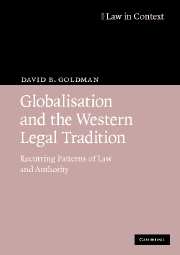Book contents
- Frontmatter
- Contents
- Preface
- 1 Introduction
- Part 1 Towards a Globalist Jurisprudence
- Part 2 A Holy Roman Empire
- Part 3 State Formation and Reformation
- 6 Territorial law and the rise of the state
- 7 The reformation of state authority
- Part 4 A Wholly Mammon Empire?
- Part 5 Competing Jurisdictions Case Studies
- Bibliography
- Index
6 - Territorial law and the rise of the state
Published online by Cambridge University Press: 30 March 2010
- Frontmatter
- Contents
- Preface
- 1 Introduction
- Part 1 Towards a Globalist Jurisprudence
- Part 2 A Holy Roman Empire
- Part 3 State Formation and Reformation
- 6 Territorial law and the rise of the state
- 7 The reformation of state authority
- Part 4 A Wholly Mammon Empire?
- Part 5 Competing Jurisdictions Case Studies
- Bibliography
- Index
Summary
About twenty generations or ten grandparents ago, the notion of the state as we know it was dawning. Before then, as we have seen, there was certainly law. University-trained lawyers, law books, rule of law, and courts with rules and procedures which (like today) left laypersons cold, were permeating Western Europe. They lubricated diverse social systems and their interconnections. Jurisprudence, of its nature, was general. Furthermore, jurisprudence was historical, in the sense that it was an evolving discourse which made reference to its past in a vision for the future. It was also normative, authorised by and serving an articulated ultimate reality and meaning, being God's creation, and the human's place in the world.
The supranational law of the papacy was to grow less universally effective, in tune with the emerging fortunes of the state and the decline in the political power of the papacy. A secular, selective universality would be advocated by theorists for an emerging international legal order of particularistic, self-determining states. Various theorists based this order in human consent and political will (positivism) and/or rational idealism (naturalism), without the former, universalistic, European political and moral discourse of allegiance. (Western legal science remained, nonetheless, conceptually universalistic in terms of the mechanics and institutions of Western legal systems.) Signified by the end of the Thirty Years War and the Peace of Westphalia in 1648, the continuing decline of the supranational papal authority made these new secular theories increasingly relevant.
This chapter will consider these universalistic and particularistic aspects of the Western legal tradition up until the early seventeenth century.
- Type
- Chapter
- Information
- Globalisation and the Western Legal TraditionRecurring Patterns of Law and Authority, pp. 115 - 143Publisher: Cambridge University PressPrint publication year: 2008



